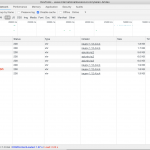Hi Chris
Anything that updates via ajax (e.g. pagination, search filters) rather than page updates will do so via a request to that address, i.e. /wp-admin/admin-ajax.php (with exceptions such as optin monster on your site that doesn't use the normal WordPress ajax request routing).
You can monitor such requests when you load a page using your browser dev tools, in the network tab, and you can isolate the ajax requests (which are type xhr).
See the screenshot which is from loading the first of your page links (Asian brides).
There is nothing particularly unusual there.
There are a couple of ajax requests from Views when the page first loads, then some requests from optin monster (but not to admin-ajax.php), then some more requests as I manually paginate the slideshow.
The action for each of these Toolset-related ajax requests does come from wpv_get_view_query_results.
So, my visiting the page, scrolling to the bottom, scrolling back to the top, going back and forth a few times with the pagination of the slideshow, generated 5 ajax requests.
It looks like your other links behave similarly.
If you are getting nearly 10,000 such requests a day, it sounds like you have about 2000 visits to any such pages with ajax-powered paginating Views each day, more if the users are not actually manually paginating the Views.
Does that sound right from the level of visitors your site has?
As I say, I don't see anything unusual when analysing the network requests when visiting such pages.
If you had maybe 200 visitors a day browsing 10 pages that have such slideshows and they interact with each of them to perform pagination a couple of times, then I would say the numbers are expected, and the only way to limit the requests to admin-ajax.php would be to remove the ajax pagination from your slideshows and change them to update via page refresh.
If nothing else, you could try that for a period of time while monitoring what happens with the admin-ajax.php requests, to see if they are largely eliminated. (If not there could be something else at work hitting your servers that do not come from routine page visits.)
